|
|
|
Sort Order |
|
|
|
Items / Page
|
|
|
|
|
|
|
| Srl | Item |
| 1 |
ID:
113117
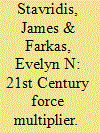

|
|
|
| 2 |
ID:
091957
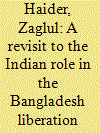

|
|
|
|
|
| Publication |
2009.
|
| Summary/Abstract |
The Liberation War of Bangladesh was seen by the Indian policy makers as a prime time to dismember Pakistan. By the creation of Bangladesh, they pondered: (a) the political enemy on both its borders would be replaced by a far weaker enemy on one side and a friend on the other; (b) secularism would be regarded as a dominant ideology for the developing countries; (c) India would emerge as an Asian superpower; (d) India would establish a subservient government in Bangladesh; (e) Bangladesh would be an extension of the Indian market; (f) India would materialize the Nehruvian vision of the Greater Indian Union.
|
|
|
|
|
|
|
|
|
|
|
|
|
|
|
|
| 3 |
ID:
127065
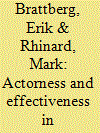

|
|
|
|
|
| Publication |
2013.
|
| Summary/Abstract |
This article examines the role of the European Union (EU) and United States as actors in international disaster relief. We take the analysis of 'actorness' one step further than normal by assessing the extent to which different aspects of EU and US actorness led to effectiveness in actual outcomes. In doing so, we make two contributions. First, we provide a rare comparison between EU and US foreign policy actorness, shedding light on the actor capability of each bloc in the area of international disaster relief. Second, we specify the relationship between actorness and effectiveness, a relationship which is too often assumed rather than explored. Using previous research of EU and US actorness as a starting point, we link four aspects of actorness to effectiveness and assess the resulting hypotheses using the case of the 2010 Haiti earthquake. We find support for our proposed links between actorness and effectiveness, although further research is needed before robust conclusions can be drawn.
|
|
|
|
|
|
|
|
|
|
|
|
|
|
|
|
| 4 |
ID:
130361
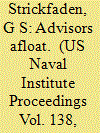

|
|
|
| 5 |
ID:
138309
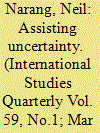

|
|
|
|
|
| Summary/Abstract |
Humanitarian aid has rapidly emerged as a core component of modern peacebuilding and post-conflict reconstruction. However, some practitioners and policymakers claim that humanitarian assistance may actually prolong conflict. The current debate about the effect of humanitarian aid on conflict underspecifies causal mechanisms and takes place largely through case studies. I use a bargaining framework to argue that aid can inadvertently increase each combatant's uncertainty about the other side's relative strength, thereby prolonging civil war. I test my argument using panel data on cross-national humanitarian aid expenditures. From 1989 to 2008, increased levels of humanitarian assistance lengthen civil wars, particularly those involving rebels on the outskirts of a state. This result suggests that policymakers need to carefully consider whether the specific benefits provided by humanitarian aid outweigh the risk of prolonging civil conflicts, and to look for methods of disbursement that reduce that risk.
|
|
|
|
|
|
|
|
|
|
|
|
|
|
|
|
| 6 |
ID:
186856


|
|
|
|
|
| Summary/Abstract |
Why do Southeast Asian states use regional mechanisms for disaster relief? From a conventional functionalist perspective, inadequate domestic-level responses to emergencies create a demand for scaled-up governance. This article offers an alternative interpretation of disaster cooperation in Southeast Asia. Drawing on theoretical insights from comparative regionalism and critical disaster studies, it argues that the raison d’être of the Association of Southeast Asian Nations (ASEAN) Coordinating Centre for Humanitarian Assistance on Disaster Management (AHA Centre) is to empower ASEAN states vis-à-vis extraregional humanitarian actors. The AHA Centre works to enable Member States to gatekeep intrusive extraregional aid and, ultimately, to transform authority relations in the international humanitarian system in favor of state actors that have traditionally found themselves in a peripheral and passive role.
|
|
|
|
|
|
|
|
|
|
|
|
|
|
|
|
| 7 |
ID:
137943
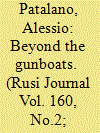

|
|
|
|
|
| Summary/Abstract |
In East Asia, the coercive use of maritime capabilities has led some to argue that the return of gunboat diplomacy has become inevitable. The use of coercion and deterrence there are indeed undeniable. However, Alessio Patalano argues that there is more than gunboats to diplomacy in a self-aware maritime East Asia. Capable navies can offer a significant contribution when dealing with major natural disasters, and these deployments should be regarded as diplomatic missions aimed at building relations and enhancing regional security. Japan's experience in this regard provides a relevant case in support of this argument.
|
|
|
|
|
|
|
|
|
|
|
|
|
|
|
|
| 8 |
ID:
130383
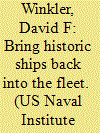

|
|
|
| 9 |
ID:
075675
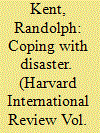

|
|
|
| 10 |
ID:
153724
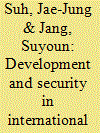

|
|
|
|
|
| Summary/Abstract |
In this paper, we contend that the nexus of security and development lies in the crux of challenges confronting human security and aid failure in North Korea. We first review academic and policy discourses concerning the security-development nexus. We then analyse how the nexus works out its logic in North Korea by exploring how insecurity and underdevelopment have fed into each other, producing a vicious cycle that complicates efforts to address human security in North Korea. In the third and main section, we examine the ways in which South Korea, the USA and the EU provided for assistance to North Korea from 1995 to 2012 at national and international policy levels. We analyse their approaches to international aid and identify differences and commonalities in them so as to better understand how aid giving exacerbates or mitigates the insecurity/underdevelopment and then impacts on the development-security nexus. We finally conclude with a consideration of various strategies to help overcome the dual challenges of underdevelopment and insecurity that besiege North Korea.
|
|
|
|
|
|
|
|
|
|
|
|
|
|
|
|
| 11 |
ID:
153579
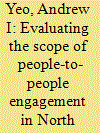

|
|
|
|
|
| Summary/Abstract |
Although North Korea remains one of the most isolated countries in the world, hundreds of foreign actors continue to work quietly inside the country. What is the size and scope of foreign engagement inside the Democratic People's Republic of Korea (DPRK)? What types of activities do nongovernmental organizations, businesses, and other private actors conduct? What has been the experience and impact of those working inside the DPRK? Relying on an original data set and interviews with sixteen organizational field representatives and staff members with experience working inside the DPRK, I uncover basic trends related to people-to-people engagement in areas such as humanitarian relief, development assistance, educational assistance, professional training, and business interaction. Although impressive growth has taken place in foreign engagement in the DPRK, its potential impact remains unclear due to ongoing internal and external constraints.
|
|
|
|
|
|
|
|
|
|
|
|
|
|
|
|
| 12 |
ID:
155569


|
|
|
|
|
| Summary/Abstract |
Violence is woven into the stream of consciousness as terrible and normal at the same time.
|
|
|
|
|
|
|
|
|
|
|
|
|
|
|
|
| 13 |
ID:
186071
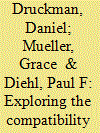

|
|
|
|
|
| Summary/Abstract |
In their 2018 article, Diehl and Druckman address several hurdles that may hinder the effectiveness of multiple mission peace operations. One of these hurdles is the extent to which two or more missions are compatible. Based on the idea that similar missions have positively reinforcing effects, we propose alternative indicators of the compatibility concept in the context of nine types of UN missions conducted within the same peace operation. We code all missions in each of 70 UN peace operations (1948–2016) on twelve characteristics, such as whether the mission could be considered impartial or biased, whether it allows for an easy or hard exit, and coordination with IOs or the host government. A multidimensional scaling analysis is performed to evaluate the proximity of these missions: missions closer in proximity are regarded as being more compatible than those farther away. The proximity scores are used to develop the three compatibility indicators based on different theoretical logics. We then apply these indicators in some preliminary statistical analyses and also compare two peace operations with different compatibility characteristics to illustrate on-the-ground relevance of the indicators. Methodological issues concerning validity, next steps in the research, and policy implications are discussed.
|
|
|
|
|
|
|
|
|
|
|
|
|
|
|
|
| 14 |
ID:
123529
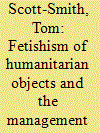

|
|
|
|
|
| Publication |
2013.
|
| Summary/Abstract |
This paper examines two common objects in humanitarian assistance: a therapeutic food called Plumpy'nut, and a tape for measuring malnutrition known as the muac band. It argues that humanitarian relief has become a standardised package reliant on such objects, which receive excessive commitment from aid workers and are ascribed with almost magical powers. Drawing on the Marxist notion of commodity fetishism, the paper proposes a three-part model for examining this phenomenon, in which humanitarian objects are bound up in processes of concealment, transformation and mystification. First, these objects are perceived as rootless, recent discoveries, allowing the complex history and ambivalent results of technology to be concealed. Second, they facilitate a single-minded attention to efficiency and aggregate survival, which transforms the way humanitarian action is understood. Third, these objects are imbued with a mystical and autonomous spirit, redefined as irreplaceable elements of aid. This 'fetishism of humanitarian objects', the paper concludes, prevents a more flexible and people-centred approach to relief.
|
|
|
|
|
|
|
|
|
|
|
|
|
|
|
|
| 15 |
ID:
130260
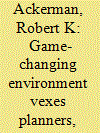

|
|
|
| 16 |
ID:
068572
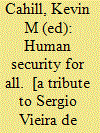

|
|
|
|
|
| Publication |
New York, Fordham University Press, 2004.
|
| Description |
xxi, 296p.
|
| Series |
International humanitarian affairs
|
| Standard Number |
082322399X
|
|
|
|
|
|
|
|
|
|
|
|
Copies: C:1/I:0,R:0,Q:0
Circulation
| Accession# | Call# | Current Location | Status | Policy | Location |
| 051078 | 361.26/CAH 051078 | Main | On Shelf | General | |
|
|
|
|
| 17 |
ID:
149696
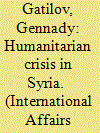

|
|
|
|
|
| Summary/Abstract |
THE HUMANITARIAN CRISIS in the Syrian Arab Republic, which has resulted from a protracted civil conflict in that country, can be described as the most wide-ranging in modern history. Here are just a few figures standing behind which are human lives and fates.
|
|
|
|
|
|
|
|
|
|
|
|
|
|
|
|
| 18 |
ID:
078312
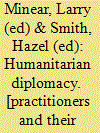

|
|
|
|
|
| Publication |
New York, United Nations University press, 2007.
|
| Description |
xiv, 407p.
|
| Standard Number |
9280811347
|
|
|
|
|
|
|
|
|
|
|
|
Copies: C:1/I:0,R:0,Q:0
Circulation
| Accession# | Call# | Current Location | Status | Policy | Location |
| 052495 | 363.34988/MIN 052495 | Main | On Shelf | General | |
|
|
|
|
| 19 |
ID:
079195
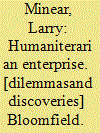

|
|
|
|
|
| Publication |
Bloomfield, Kumarian Press, 2002.
|
| Description |
xiii, 288p.
|
| Standard Number |
1565491491
|
|
|
|
|
|
|
|
|
|
|
|
Copies: C:1/I:0,R:0,Q:0
Circulation
| Accession# | Call# | Current Location | Status | Policy | Location |
| 046810 | 361.26/MIN 046810 | Main | On Shelf | General | |
|
|
|
|
| 20 |
ID:
178322
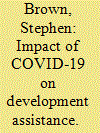

|
|
|
|
|
| Summary/Abstract |
This article analyzes the impact of the COVID-19 pandemic on foreign aid. Using examples from Canadian foreign aid, it argues that, despite the terrible toll it is exacting, the crisis has accelerated some significant positive pre-existing trends, both by destabilizing the perception of aid as flowing essentially from the Global North to Global South and by reinforcing awareness of the importance of joint efforts for global public goods and humanitarian assistance, as well as debt relief. However, it has also reinforced potentially harmful self-interested justifications for aid, which could align assistance more with donors’ priorities than the needs of the poor. An important trend reversal is the renewed emphasis on well-being. Two other crucial trends remain unclear—the COVID-19 pandemic’s impact on multilateral approaches and on aid flows. How donors respond to the COVID-19 pandemic and its aftermath over the next few years will depend on their political will, and will profoundly shape the future of development co-operation.
|
|
|
|
|
|
|
|
|
|
|
|
|
|
|
|
|
|
|
|
|